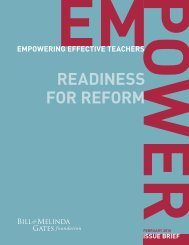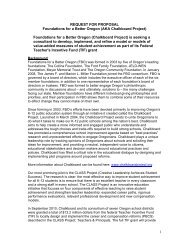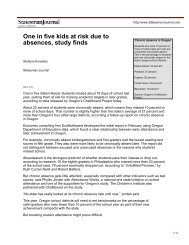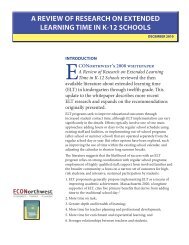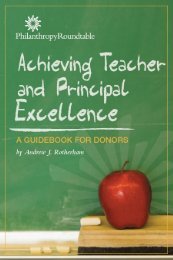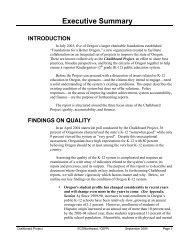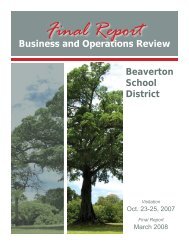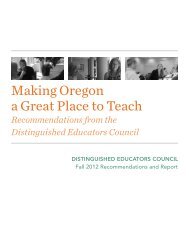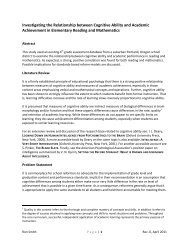Tapping the Potential - Alliance for Excellent Education
Tapping the Potential - Alliance for Excellent Education
Tapping the Potential - Alliance for Excellent Education
Create successful ePaper yourself
Turn your PDF publications into a flip-book with our unique Google optimized e-Paper software.
A L L I A N C E F O R E X C E L L E N T E D U C AT I O N60 Villar, Measuring <strong>the</strong> Benefits and Costs ofMentor-Based Induction.61 Ingersoll, Is There Really a TeacherShortage? Progress Through <strong>the</strong> TeacherPipeline: 1992–93 College Graduates andElementary/Secondary School Teaching as of1997 (Washington, D.C.: U.S. Departmentof <strong>Education</strong>, National Center <strong>for</strong><strong>Education</strong> Statistics, 2000).62 Smith and Ingersoll, “What Are <strong>the</strong>Effects of Induction and Mentoring onBeginning Teacher Turnover?”63 American Federation of Teachers,Beginning Teacher Induction.64 Serpell and Bozeman, Beginning TeacherInduction. Johnson, Finders and Keepers.65 Claycomb and Hawley, Recruiting andRetaining Effective Teachers <strong>for</strong> Urban Schools.Jonathan Supovitz and Jolley BruceChristman, Developing Communities ofInstructional Practice: Lessons from Cincinnatiand Philadelphia (Philadelphia: Consortium<strong>for</strong> Policy Research in <strong>Education</strong>, 2003).66 D. Kyle, G. Moore, and J. Sanders, “TheRole of <strong>the</strong> Mentor Teacher: Insights,Challenges, and Implications,” PeabodyJournal of <strong>Education</strong> 74:3–4 (1999). C.Evertson and M. Smi<strong>the</strong>y, “MentoringEffects on Protégés’ Classroom Practice:An Experimental Field Study,” Journal of<strong>Education</strong>al Research 9:5 (2000).67 Richard Ingersoll and Jeffrey Kralik, TheImpact of Mentoring on Teacher Retention:What <strong>the</strong> Research Says (Denver, CO:<strong>Education</strong> Commission of <strong>the</strong> States, 2004).68 Mentor Teacher Selection (Santa Cruz, CA:New Teacher Center, 2004).69 Ellen Moir, Launching <strong>the</strong> NextGeneration of Teachers Through QualityInduction (Washington, D.C.: NationalCommission on Teaching and America’sFuture, 2003).70 Smith and Ingersoll, “What Are <strong>the</strong>Effects of Induction and Mentoring onBeginning Teacher Turnover?”71 Ellen Moir, “Fostering LeadershipThrough Mentoring,” <strong>Education</strong>alLeadership 60:8 (May 2003).72 Ellen Moir, correspondence withJeremy Ayers, 4 May 2004.73 Moir, “Fostering Leadership ThroughMentoring.” Barnett Berry, PeggyHopkins-Thompson, and Mandy Hoke,Assessing and Supporting New Teachers:Lessons from <strong>the</strong> Sou<strong>the</strong>ast (Chapel Hill, NC:Sou<strong>the</strong>ast Center <strong>for</strong> Teaching Quality,2002).74 Supovitz and Christman, DevelopingCommunities of Instructional Practice.75 Joellen Killion, What Works in <strong>the</strong> HighSchool Grades: Results-Based StaffDevelopment (Ox<strong>for</strong>d, OH: National StaffDevelopment Council, 2002).76 Supovitz and Christman, “DevelopingCommunities of Instructional Practice.”77 David Kauffman et al., “Lost at Sea”: NewTeachers’ Experiences with Curriculum andAssessment (Cambridge, MA: HarvardProject on <strong>the</strong> Next Generation ofTeachers, 2002).78 Beyond Islands of Excellence. ModelStandards <strong>for</strong> Beginning Teacher Licensing,Assessment, and Development: A Resource <strong>for</strong>State Dialogue (Washington, D.C.: Councilof Chief State School Officers, 1992).79 Jonathan Supovitz and Valerie Klein,Mapping a Course <strong>for</strong> Improved StudentLearning: How Innovative SchoolsSystematically Use Student Per<strong>for</strong>mance Datato Guide Improvement (Philadelphia, PA:Consortium <strong>for</strong> Policy Research in<strong>Education</strong>, 2003).80 Teacher Preparation and ProfessionalDevelopment 2000 (Washington: D.C.: U.S.Department of <strong>Education</strong>, National Center<strong>for</strong> <strong>Education</strong> Statistics, 2001). JudithLittle, Teachers’ Professional Development in aClimate of <strong>Education</strong> Re<strong>for</strong>m (Washington,D.C.: U.S. Department of <strong>Education</strong>,1994).81 Michael Garet, “What MakesProfessional Development Effective?”American <strong>Education</strong>al Research Journal(Winter 2001). “Principles <strong>for</strong> ProfessionalDevelopment” (Washington, D.C.:American Federation of Teachers, 2002).82 Standards in Practice (Washington, D.C.:<strong>Education</strong> Trust, 2004), as seen athttp://www2.edtrust.org/EdTrust/SIP+Professional+Development/.83 Michael Kamil, Adolescents and Literacy:Reading <strong>for</strong> <strong>the</strong> 21st Century (Washington,D.C.: <strong>Alliance</strong> <strong>for</strong> <strong>Excellent</strong> <strong>Education</strong>,2003). Anne Grosso de León, The UrbanHigh School’s Challenge: Ensuring Literacy <strong>for</strong>Every Child (New York: CarnegieCorporation of New York, 2002).84 Feiman-Nemser, “What New TeachersNeed to Learn.”85 Bill Manolios, Christine Rowland, andPatsy Wooters, “From Study Groups to aSchoolwide Initiative,” UFT Teacher CenterSpecial Edition (2004).86 Kendall Stansbury and JoyZimmerman, “Smart Induction ProgramsBecome Lifelines <strong>for</strong> <strong>the</strong> BeginningTeacher,” Journal of Staff Development 23:4(Fall 2002).87 Loren Anderson, An External Review ofSouth Carolina’s Assisting, Developing, andEvaluating Professional Teaching (ADEPT)Program (Columbia, SC: AndersonResearch Group, 2003).88 Teachers College Innovations: ProfessionalDevelopment That Makes a Lasting Difference(New York: Columbia Teachers College,2003).89 Dwight Rogers and Leslie Babinski, FromIsolation to Conversation: Supporting NewTeachers’ Development (Albany: StateUniversity of New York Press, 2002). HarryK. Wong, “Collaborating with Colleagues toImprove Student Learning,” ENC Focus11:6 (2003).90 American Federation of Teachers,Beginning Teacher Induction.66



